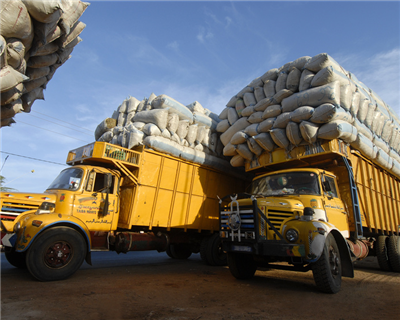Warehousing and mobile payments key to creating intra-African trade corridors for agriculture
Developing internal trade corridors for agriculture in Africa and removing obstacles to formal trade will help farmers benefit from rapidly rising food demand in African cities, the Fin4Ag conference in Nairobi heard Tuesday (July 15). Tools like warehouse finance can support that process.

Developing internal trade corridors for agriculture in Africa and removing obstacles to formal trade will help farmers benefit from rapidly rising food demand in African cities, the Fin4Ag conference in Nairobi heard Tuesday (July 15). Tools like warehouse finance can support that process.
“All the lights are green in terms of demand,” says Lamon Rutten, manager - policies, markets and ICTs at CTA. “Someone needs to finance that.”
Food demand in the cities of Accra, Lagos and Nairobi will reach $6.7 billion by 2022, up from $2 billion in 2012. However, rural households in Nigeria currently buy 30% of the food they consume.
And in 2011, Sub-Saharan Africa imported $43 billion worth of agricultural commodities, while exporting $34 billion worth. It is “absolutely ridiculous” that Africa is a net exporter of agriculture, Rutten says.
Too much agri trade in Africa however is informal, due to high tariffs, inconsistent standards and specifications for produce, and insufficient infrastructure. These create barriers that force trade in agricultural products underground, exposing populations to risk, according to Gerald Makau Masila, executive director of the Eastern Africa Grain Council.
New, formal trade corridors - helping agricultural products flow from surplus areas to deficit areas - need to be created, says Rutten. Developments in mobile money will help by cutting transaction costs, reducing theft and embezzlement and allowing for new and innovative structures, he says. The promotion of commodity exchanges, warehouse receipt finance and collateral management will also support the financing of formal internal trade.
Products like warehouse receipt finance can be key building blocks to build channels for formal trade and incentivise value chain players like farmers and traders to enter the mainstream, agrees Makau Masila. Specification standards plus robust market information systems and supportive trade policies will also help.
With less than 40% of African agricultural trade taking place within the continent, “there is so much scope for us to trade within Africa,” agrees George Magai, director - trade and markets, Alliance for Commodity Trade in Eastern and Southern Africa (ACTESA). “Africans should find solutions to African problems.”





